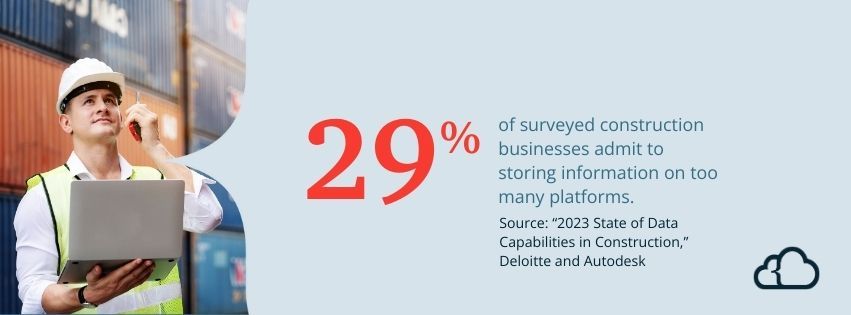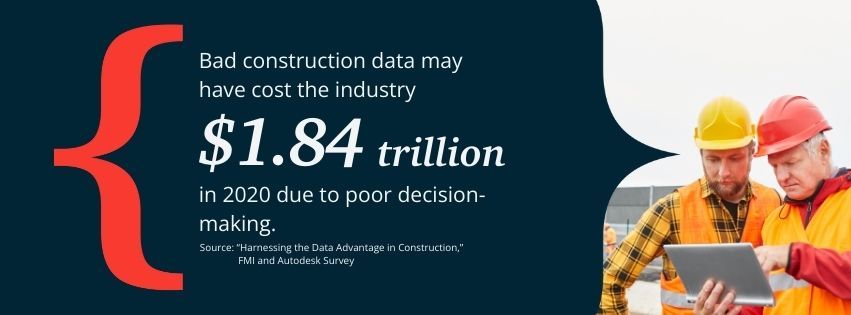How to Make a Profit with a Guaranteed Maximum Price Contract
Costs balloon easily in construction—but they don't have to. The right contract paired with a robust ERP system can help keep a project within budget and on time.
Cost management is one of the greatest concerns in any business, but it carries significant weight in the construction industry. As an owner or contractor, you must deal with fluctuating material prices and unforeseen costs on nearly every project.
Fortunately, both parties have several tools available to help mitigate the issue. For example, a Guaranteed Maximum Price (GMP) contract paired with a NetSuite Enterprise Resource Planning (ERP) system can set a cost ceiling for a project and carefully manage expenses to avoid budget overruns.
We know how easy it is for a project’s budget to balloon. News outlets often run stories about delayed road or municipal building constructions that have encountered problems, and the final cost for those builds usually exceeds original estimates.
This guide details the GMP contract's definition, uses, and best practices. It also outlines how NetSuite ERP software can help contractors manage projects efficiently, comply with the agreement's terms, and improve communication with clients to avoid conflict.
SuiteDynamics works with NetSuite to customize and implement NetSuite ERP software. Our experts can explain the system in detail during a free consultation, and you can discover how well a construction project can run.

What Is a Guaranteed Maximum Price Contract?
Construction projects can get out of hand quickly. Large builds often take 20% longer to complete than expected and run 80% over budget, according to McKinsey & Company. GMP contracts help remedy these issues.
The concept is simple: a GMP contract limits a construction project’s cost, guaranteeing that the contractor will not exceed a maximum. Joseph Clancey, product marketing specialist at NetSuite, says this type of agreement can benefit both owners and contractors.
“These contracts are suitable for customers with tight budgets since there is a firm cost threshold,” he writes. “Depending on the stipulations of the contract, customers may get to keep the savings if the project comes in under the GMP, but it's common to share with contractors as an incentive to finish under budget.”
A GMP contract’s key features include:
- Cost Cap: The contractor agrees to deliver the project within a certain budget and will absorb any overruns.
- Efficiency Incentive: There’s a better chance for effective cost management since the contractor covers cost overruns.
- Transparency: GMP contracts often require detailed cost documentation, ensuring transparency between the owner and contractor.
For instance, imagine you are managing a new commercial building project. You and the contractor agree on a GMP of $2 million. If the project costs $2.1 million, the contractor absorbs the extra $100,000. However, if costs are managed well and the project is completed for $1.9 million, both parties may share the savings, according to the contract terms.
When Are GMP Contracts Used?
GMP contracts are beneficial in situations that require cost predictability and risk management, such as the scenarios and examples below.
- Complex Projects with Clear Scope: High-rise buildings, hospitals, and complex infrastructure
- Projects with Budget Constraints: Sector projects, non-profit developments
- Fast-track Projects: Retail buildouts, commercial renovations
- Projects with Shared Savings Incentives: Collaborative developments, joint ventures
- Projects Requiring High Transparency: Client-sensitive projects, high-profile developments
Of course, contractors should review a project’s scope carefully before agreeing to a contract’s terms, no matter the build type. They will be responsible for budget overruns, so they need to consider all project aspects and determine whether they can fulfill them efficiently enough to make a profit.
Best Practices for a Guaranteed Maximum Price Contract
Contractors and owners must follow best practices that foster transparency, collaboration, and efficiency to get the most out of GMP agreements.
1. Detailed Project Scope
A well-defined project scope is crucial in a GMP contract. It should include comprehensive plans, specifications, and a clear understanding of project requirements. A thorough description reduces the risk of misunderstandings and ensures all parties share a common vision.
Best Practice: Work closely with architects and engineers to develop detailed plans and specifications before finalizing the GMP contract. This collaboration helps create an accurate cost estimate and reduces the likelihood of expensive changes later.
2. Transparent Cost Estimation
Transparency in cost estimation builds trust and ensures the GMP reflects a realistic maximum price. The budget must break down costs into detailed line items for the contractor and owner.
Best Practice: Use open-book accounting, where the contractor provides detailed cost information to the owner. This transparency helps identify potential savings and builds a collaborative relationship.
3. Contingency Planning
You can’t always predict a construction project’s every cost, so contractors incorporate contingency funds (money designated for unforeseen expenses) into their budgets. They base these funds on realistic risk assessments.
Best Practice: The budget should include a reasonable contingency percentage of the total project cost to cover unexpected expenses, typically around 5-10%. The contract should clearly define how and when these funds can be used to avoid disputes.
4. Clear Contract Language
The contract should clearly state the roles, responsibilities, and expectations of all parties involved and the process for handling changes and disputes.
Best Practice: Engage legal experts who have experience with the construction industry to draft and review the GMP contract. Ensure all parties can understand its language.
5. Collaborative Communication
Regular communication between the owner, contractor, and subcontractors fosters a proactive approach to problem-solving and decision-making, keeping everyone informed about progress and potential issues.
Best Practice: Schedule regular project meetings to discuss progress, challenges, and adjustments. Encourage open communication channels to address issues promptly.
6. Performance Incentives
An owner can incorporate performance incentives into the contract, motivating the contractor to complete the project within budget and on schedule. These incentives should be clearly defined and achievable.
Best Practice: A GMP contract could include bonuses for early completion or cost savings and the criteria for earning these incentives.
7. Thorough Documentation
Both parties should maintain comprehensive documentation throughout the project, keeping records of all communications, approvals, changes, and expenditures. Proper documentation helps resolve disputes and ensures accountability.
Best Practice: Use project management software to track documentation, approvals, and expenses.
An ERP system like NetSuite tracks purchase orders and expenses, analyzes the data, and offers all parties complete visibility of a project’s finances. Once a contractor and owner draft and sign a clear and comprehensive GMP contract, NetSuite can help them follow the terms of the agreement and avoid disputes.
SuiteDynamic experts can explain the software in greater detail during a free consultation. You can explore the system’s features and learn how NetSuite can help keep your construction projects on track and within budget.

The Role of ERP Systems in Construction
A large construction project can involve a dizzying number of moving parts. A contractor may coordinate with hundreds of vendors before completion while also managing the construction site. The right software can make this mammoth task possible.
For example, this McKinsey and Company article references an American tunnel project involving nearly 600 vendors. To handle the chaos, the contractor used a solution that supported bidding, tendering, and contract management on one digital platform. The development saved staff more than 20 hours of work per week and decreased the time needed for report generation by 75%.
An ERP system like NetSuite takes that idea further. It combines entire business processes into a single system so you can manage resources, financials, and operations on a centralized platform. The software offers several advantages for construction companies, including:
- Centralized Data Management: According to a report from Deloitte and Autodesk, 29% of surveyed businesses admit to storing information on too many platforms, and 26% have difficulty integrating data across those platforms. NetSuite solves the problem by storing all project-related information in one database, improving accessibility and reducing data silos.
- Real-Time Reporting: Up-to-date financial and operational reports help users make informed decisions.
- Automation: The Midwest Economic Policy Institute reports that automation can handle roughly 49% of all construction tasks. NetSuite offers several automated processes, reducing manual effort and errors.
How GMP Contracts and NetSuite ERP Work Together
A NetSuite ERP system helps owners and contractors manage GMP contracts by integrating and automating project management and financial processes. This process integration offers four primary benefits.
1. Budget and Cost Control
Managing GMP contracts requires complete visibility into a project’s finances. NetSuite allows you to track project budgets and actual costs through the following features.
- Budget Setup: Define the GMP budget within NetSuite, setting up cost categories and allocations.
- Cost Tracking: Track actual costs against the GMP budget in real time. NetSuite’s project accounting capabilities allow detailed monitoring of labor, materials, and other expenses. The system also alerts you if spending approaches set limits.
- Variance Analysis: Identify and analyze variances between planned and actual costs, ensuring the project stays within the GMP.
2. Contract Management and Compliance
NetSuite streamlines contract management, ensuring compliance with GMP terms. It offers:
- Document Management: Store all contract documents and change orders within the system so you can access and manage them easily.
- Change Order Tracking: Record and track change orders, ensuring any scope of work changes are documented and accounted for in the GMP.

3. Real-Time Financial Reporting
According to research from FMI and Autodesk, bad construction data may have cost $1.84 trillion in 2020 due to poor decision-making and contributed to 14% of all construction rework. That’s why accurate financial reporting is crucial for managing GMP contracts. NetSuite helps by providing:
- Cash Flow Management: Monitor project cash flow and ensure financial stability with integrated project costs and revenues.
- Customizable Reports: Deloitte found that 94% of surveyed construction businesses consider data collection and analysis effective for decision-making, and almost a third believe it’s extremely effective. This software allows you to create custom reports to analyze costs, project progress, and financial performance. Because this software boosts reporting capabilities, it offers construction companies an edge.
4. Subcontractor Management
Some projects involve multiple subcontractors, which can complicate operations. NetSuite simplifies subcontractor management with:
- Subcontractor Agreements: Manage subcontractor agreements and track their performance against the GMP.
- Payment Processing: Automate payment processing for subcontractors based on completed work, aligning with the GMP terms.
During your free consultation, suiteDynamics experts can answer more questions about how NetSuite benefits construction companies. We can also demo the system so you can see how its automation, reporting, and tracking features might help your business thrive.
Experience the Miracle of a Managed Budget
No one wants to be part of a poorly managed construction project. They involve numerous delays and constant stress and always seem to conclude with embarrassing budget overruns.
We understand how frustrating these situations can be, and we don’t want you to face a blown budget.
GMP contracts and NetSuite ERP systems are excellent project management tools that help your company execute well-planned construction builds. Whether you’re an owner or contractor, they provide financial and communication benefits that help complete quality projects within time and budget limits.
Schedule a free consultation with our experts to learn more about the NetSuite ERP platform and its construction-specific features. We’ll explain how it can meet your needs with robust capabilities in budget management, real-time reporting, and subcontractor coordination. Your projects will soon become more efficient and profitable than you ever dreamed.
We pull information from NetSuite material, SuiteDynamics experts, and other reliable sources to compose our blog posts and educational pieces. We ensure they are as accurate as possible at the time of writing. However, software evolves quickly, and although we work to maintain these posts, some details may fall out of date. Contact SuiteDynamics experts for the latest information on NetSuite ERP systems.
Part of this text was generated using GPT-3, OpenAI’s large-scale language-generation model. After generating the draft language, our team edited, revised, and fact-checked it to ensure readability and accuracy. SuiteDynamics is ultimately responsible for the content of this blog post.












